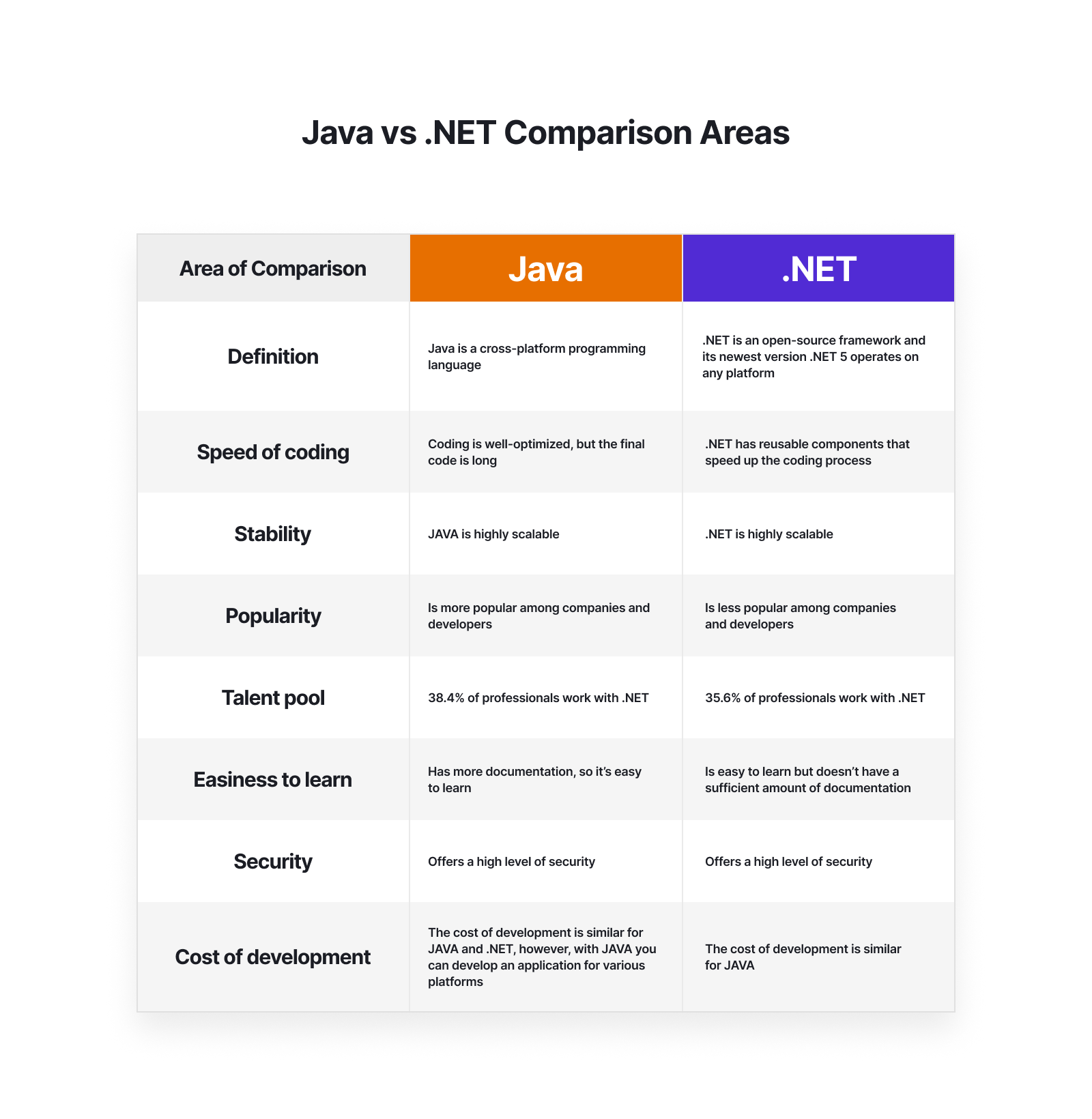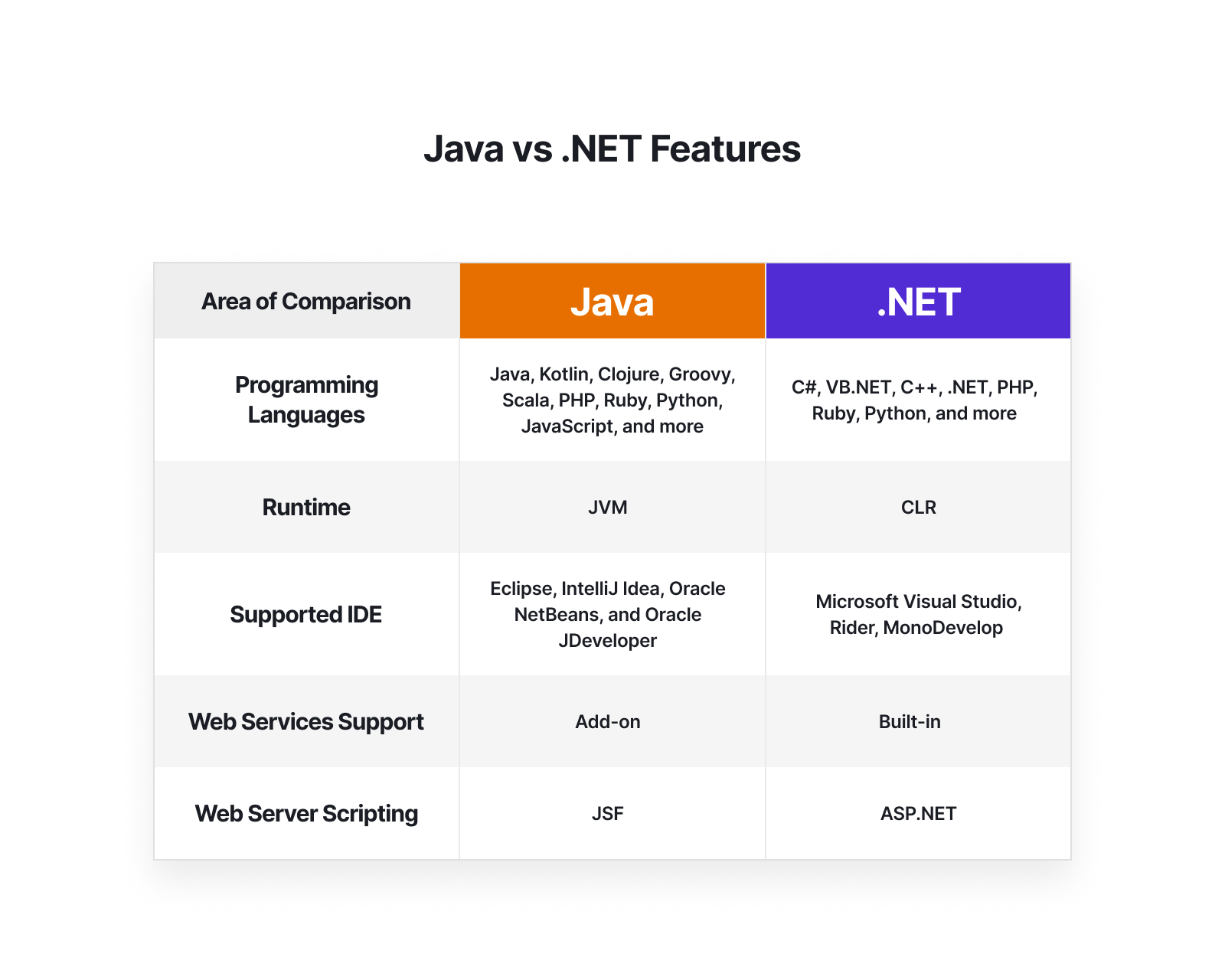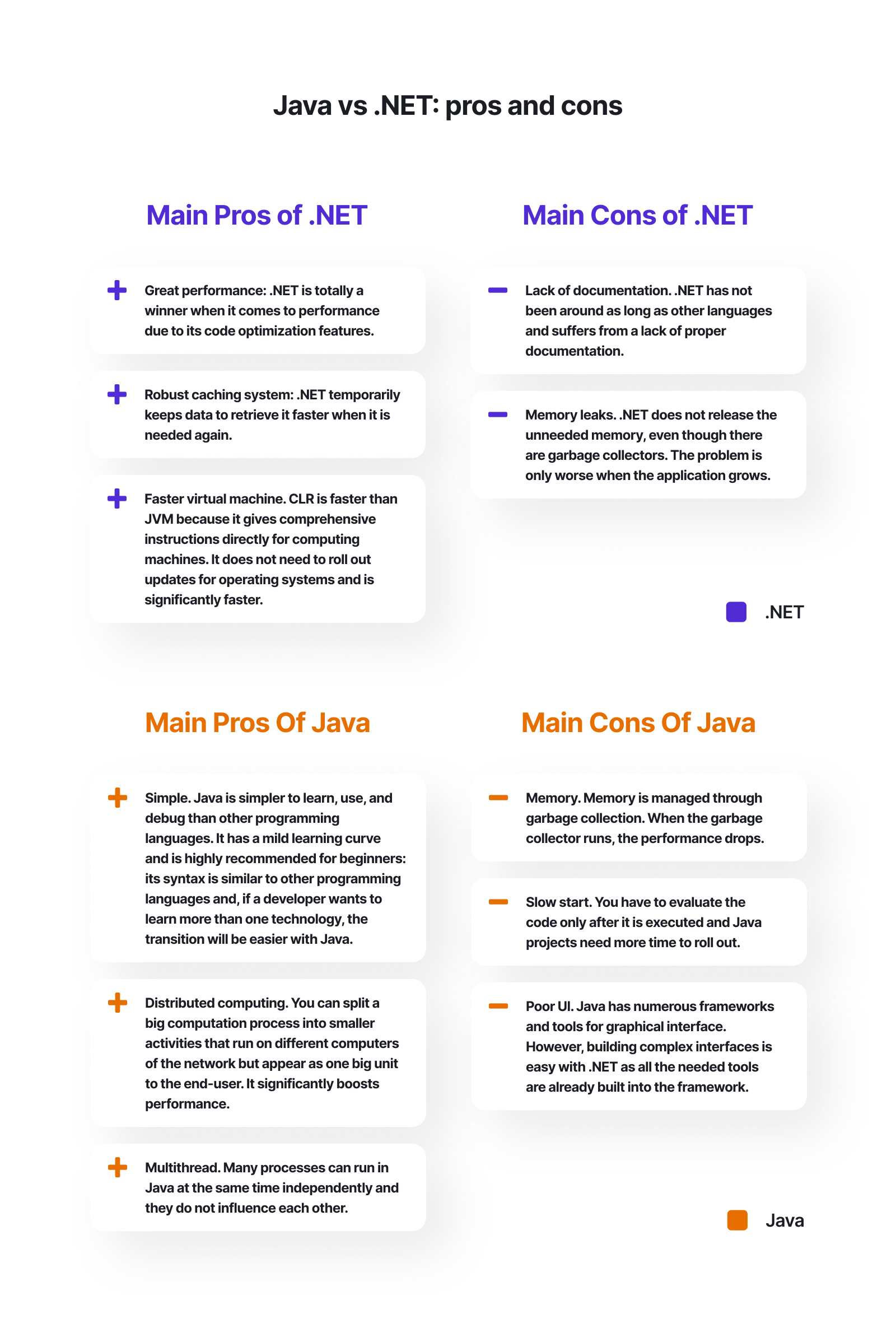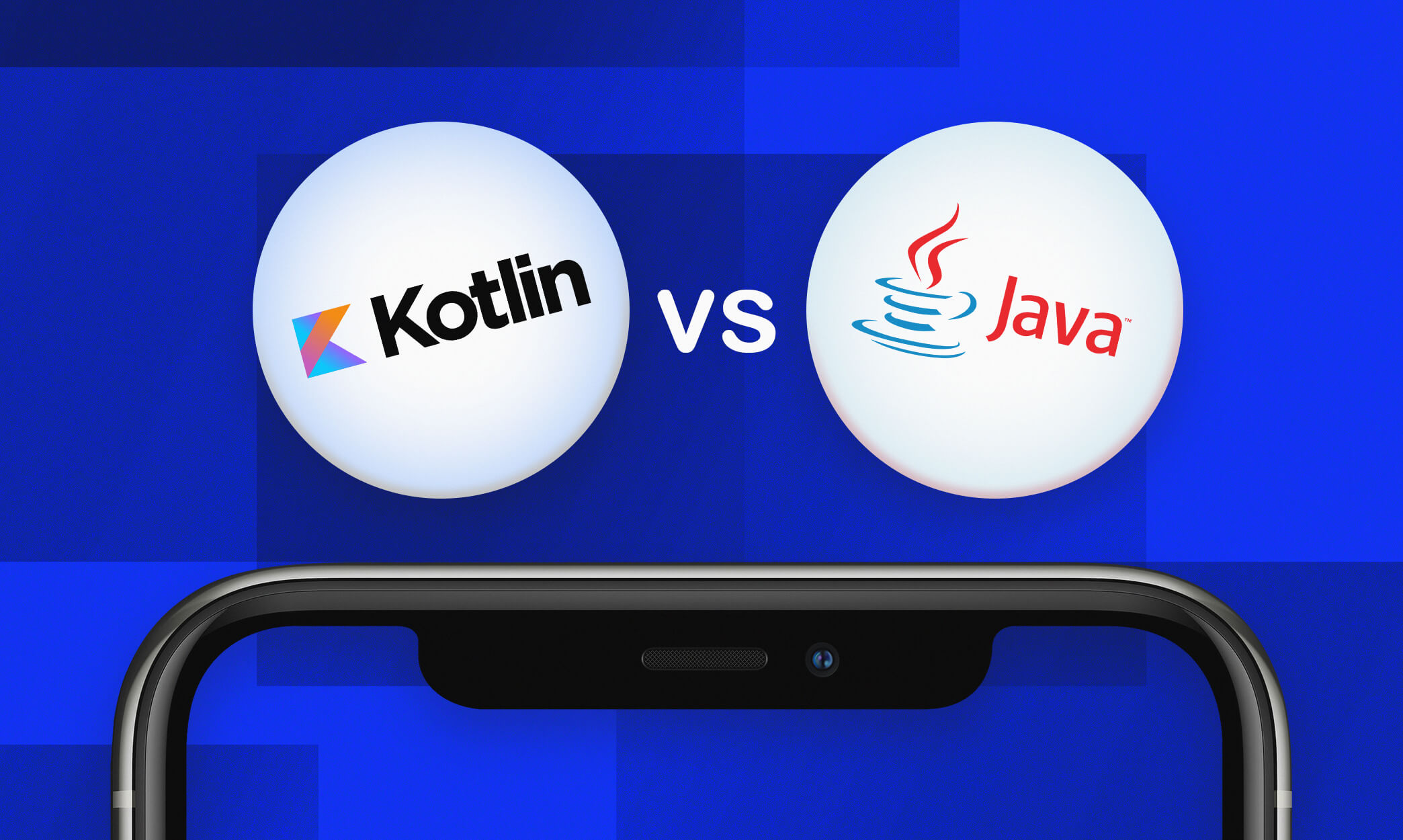In the realm of software development, numerous decisions need to be made, with one of the most daunting being the selection of appropriate technology. As we navigate 2023, both Chief Technology Officers (CTOs) and product owners continually grapple with this challenging choice, recognizing its significant impact on their projects' success.
The task is even harder when you go read articles or browse IT communities. Developers are just too eager to defend their preferred technology and the war has no end. While one developer will find thousands of cons in their technology, the other will ignore them completely and provide a list of disadvantages.
We want to create the least subjective overview of technologies. We have already discussed Java vs Kotlin and Java vs PHP.
Today, Java is about to take part in the battle of frameworks. The ultimate question of whether .NET or Java is more fitting for software development will be discussed today.
If you are a business owner who decides on what developers to hire for the next project or a developer who can not decide what technology to learn, keep reading and find out:
- What is Java?
- What is .NET?
- Why are they compared?
- Pros and cons of both technologies
- What are their areas of usage?
We do not have an answer to the question of which technology is better because they both have their advantages and disadvantages. There are no better or worse technologies in software development overall. There are just more fitting ones.
What Is .NET?
.NET is an open-source framework developed by Microsoft and is oriented to users of Microsoft products. When it was first introduced in 2002, the framework was used for Microsoft only. It means that you could not code or run developed applications on Linux, Android, or iOS. It was a close-source system as well.
In 2016, Microsoft introduced .NET Core which changed the position of the framework on the market. If many companies did not consider .NET because of its limited usage before, they started to include it in the discussions about the framework choice. It has become a good opponent for Java.
Today, .NET 5 (previously .NET Core) is a leading framework as it is free of limitations that the old Windows-only .NET Framework 4.8 possessed. .NET Framework 4.8 is now considered a legacy technology and .NET 5 is successfully utilized for developing projects of various complexity levels.
This framework supports such languages as C#, C++, F#, etc., and follows an object-oriented paradigm. .NET contains also Common Language Runtime that executes compiled source code.
What Is Java?
Java is a programming language that is cross-platform, general-purpose, class-based, and object-oriented. Even though Java was introduced 26 years ago, it is still as popular as ever: it ranked 5th in the rating of the most popular languages, according to a Stack Overflow Developer Survey.
Java works in quite an interesting way. You write a code, it is compiled to bytecode then, and Java Virtual Machine converts it, according to the requirements of different devices. Consequently, a developer needs only one code for different platforms.
Java is used in every branch you can think of: eCommerce, IoT, stock market, finance. It is even used in Big Data but it has not peaked its popularity in that niche. It is believed that Java’s potential is not fully realized and we will hear even more about it soon.
Why Should We Compare Them?
You may be wondering why we compare a programming language and a framework. The answer is that Java is often referred to as a framework as well. It supports such languages as Groovy, Scala, PHP, Ruby, Python, etc.
Both frameworks are used to build desktop or web applications and are especially popular for building complex enterprise solutions. They are object-oriented, allow code modularity, and have similar syntax even, both being based on C and C++.
So both Java and .NET are widely used for software development, enterprise-level, and big data applications. Therefore, it makes sense to compare technologies to see what fits your project as a client or your preferences as a developer.
.NET vs JAVA Comparison Areas
We’ve created a brief TL;DR table, so you could quickly decide on which technology would work better for your project.

.NET vs JAVA: Speed of Coding
Although Java offers different threads that simplify the managing and processing sequences of instructions, .NET is still a winner in terms of the speed of coding. .NET is an object-oriented technology that consists of various reusable components which means that developing the same app on .NET would take less time than on Java.
Verdict: .NET
.NET vs JAVA: Performance
Java has developed a lot of tools to scale the performance but it is still not as fast as .NET. .NET uses natively compiled languages like C# and C++. They are faster and less memory-consuming than Java. .NET also enables optimizing the code and writing less code which increases the performance. The shorter code also means fewer efforts spent on code maintenance and easier debugging. Such features are definitely attractive for both developers and clients. So .NET is definitely a winner in the JAVA vs NET performance battle.
Verdict: .NET
.NET vs JAVA: Scalability
Both technologies are one of the most stable ones after the application fully rolls out. That is why both JAVA and .NET are widely used for developing complex, large-scale applications for enterprises.
Verdict: Draw
.NET vs JAVA: Features
Both JAVA and .NET are great choices for the development of enterprise solutions that require a high level of security and stability. Let see what features these technologies have:

.NET vs JAVA: Integrated Development Environment
IDEs make the job of a developer easier by assisting in coding, testing, writing documentation, and debugging. Java has numerous IDEs but there are four most used ones: Eclipse, IntelliJ Idea, Oracle NetBeans, and Oracle Jdeveloper. The latter was developed specifically for easier writing and testing. Java’s IDEs are inbuilt plugins.
.NET, on the other hand, has integrated Visual Studio which offers language-specific features. A developer does not have to choose from a big library of IDEs since Visual Studio already has all they need.
Verdict: Draw
.NET vs JAVA: Popularity
We researched JAVA vs NET job opportunities presented on the market to understand which technology is more popular. Companies actively hire Java developers for both legacy systems and the newest technologies. At the moment, Indeed has 43,544 job postings for Java developers.
.NET developers are needed as well but the number of job postings for them is significantly lower: there are 19,755 jobs for .NET developers. Many developers are likely to pick up technologies that are more needed which means that Java probably has a greater talent pool.
Verdict: Java
.NET vs JAVA: Community
Java has been around for a longer time and was cross-platform from the start. Therefore, it has already won a big community of developers who created the web, mobile, or desktop applications on Java that ran on different platforms for years now. A big community does matter: they can always offer support or share the experience they gained over the years.
Verdict: Java
.NET vs JAVA: Talent Pool
Let’s take a look at the JAVA vs NET usage statistics to understand which technology gained bigger popularity. The data from the Stack Overflow Development Survey that involved 65,000 developers revealed that 35.9% of professionals use .NET and 38,4% JAVA.
Verdict: Java
.NET vs JAVA: Easiness to Learn
As we have mentioned before, Java and .NET are quite similar so they both will be relatively easy to learn and use. However, Java has more documentation and resources where you can learn because of the community impact and long history of development. .NET and .NET Core especially are new technologies that still have not reached the peak of their popularity.
Verdict: Java
.NET vs JAVA: Security
In terms of security, both technologies are secure. They support code signing and enforce an execution sandbox. Java had security issues for some time but they were already solved and now the technology has additional security enforcements. It is more difficult to make a mistake in Java that can lead to a reach. .NET was also known as more secure, being a closed-source system but it does not have this privilege anymore. It has all the needed measures and more for open-source systems.
Verdict: Draw
.NET vs JAVA: Cost of Development
According to Glassdoor, the average salary of a JAVA software developer is $79k and the average salary of a .NET software developer is $76.5k. The difference here is now that big, however taking into consideration that using JAVA you can develop software for various platforms, using this technology would be more cost-effective.
Verdict: Java
Main Pros And Cons Of Both Technologies
Unluckily, there is no perfect solution. One technology fails at something but delivers an advantage that is hard not to notice. Let’s find out more about the pros and cons of each technology!

Where To Use Java?
Java is a general-purpose language which means that it is used in many branches:
- Android applications
- enterprise applications (Java is widely used by the government and, consequently, often associated with legacy code. However, it is also used for modern applications like Pinterest or Spotify)
- web applications (Google Docs, Gmail)
- software (Eclipse, Jira)
- embedded systems
Where To Use .NET?
- web applications and websites
- client applications
- gaming
- enterprise development
Bottom Line
At first sight, it seems weird to compare .NET and JAVA, since the first one is a framework and the second one is a programming language. However, Java is used as a framework today as well which supports major languages like Python or Ruby.
Both technologies have quite similar use and are especially good for complex projects. While Java has a bigger community, more documentation, a bigger talent pool, and more career opportunities, .NET shows better performance and has tools for complex user interfaces.
If you are still struggling to decide what technology fits your project best, do not hesitate to reach out to Ideamotive. We can provide consultations or find experts in both technologies who will surely point you in the right direction and take care of your product.













